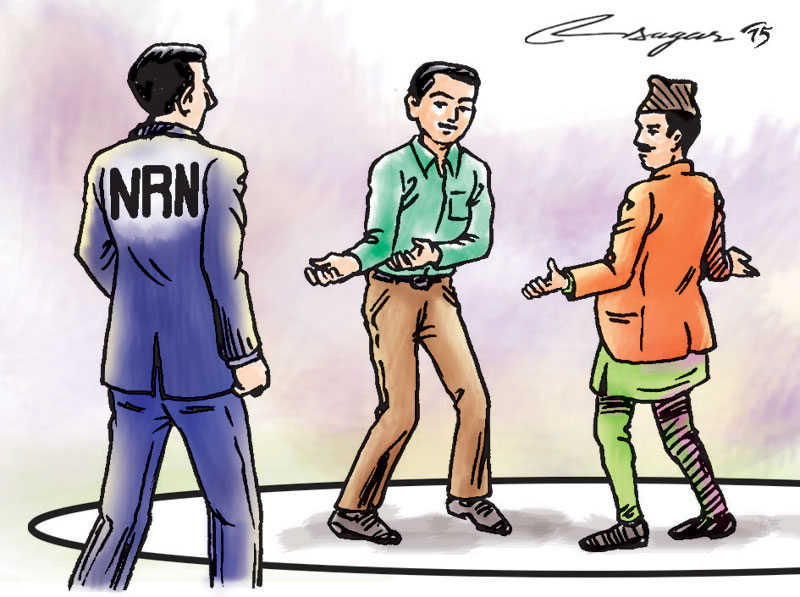NRN citizenship provision: Political rights denied
Citizenship is a sensitive issue in Nepal, as there are genuine concerns about the impact of dual citizenships—with voting rights—on politics and policies in Nepal. The fact that Nepal borders China and India, two of the most populated countries, amplifies the concerns
As the Constituent Assembly is in the process of drafting a new constitution, it is an opportune time to discuss the issue of dual citizenship, its merits and analyse the shortcomings of the current provision related to it in the draft constitution. The draft constitution has a provision on “Non-Resident Nepali (NRN) citizenship”, which says NRN citizenship “can be provided” to people of Nepali origin, who have acquired citizenship of countries outside the SAARC region. It would afford “economic, social and cultural rights”, in accordance with the laws of the country. However, it does not go far enough in that NRN citizens are not given political rights.
Dual citizenship is not a new concept; in fact, many countries in the world have this provision, notably the United States, the UK, Australia, Switzerland, Israel and over 20 countries in Africa. The rights and privileges accorded to dual citizenships vary from country to country, with some countries making no distinction between regular citizens and dual citizenships. The fact that dual citizenship is allowed by some of the richest and the most developed countries in the world should be seen as its merit and usefulness. NRN and the NRN Association have been pushing for and demanding dual citizenship rights for a while, touting its economic and development related benefits for Nepal.
One natural question is: why allow dual citizenship rights for NRN Nepalis? Perhaps the strongest argument is economic. It is a way to tap financial and other resources, including knowledge, skills and expertise, of the diaspora Nepali community that the country desperately needs. There is also an emotional argument, one that addresses the reality of emigration dynamics fro Nepal, in tune with greater labour movement and nature of a globalized economy.
As one of the poorest and least developed countries, there is a great urgency for economic development, poverty reduction and improvement in people’s lives. Achieving this, among others, requires financial resources as well as knowledge, expertise and ideas.
To raise funds in the global financial market requires a good credit rating, credibility and assurance that the money will be repaid and the borrower will not default. When this option is not available, the other way is to raise money through internal borrowing. This, however, is not without costs. Students of Macroeconomics 101 will tell you that it will result in crowding out of private investment, an undesirable outcome for the country.
As the government competes with the private sector for the savings, interest rates rises, raising the cost of borrowing and, thus, making investment less attractive. The consequence is reduced private borrowing and investment thus hurting economic growth and prospects.
To get to the heart of the argument, dual citizenship provision will spur much higher foreign investment from Nepali diaspora, and aid and assist development efforts. In fact, one study projects that it will create US $20 billion in additional investment in the real estate sector alone. It is undeniable that the Nepali diaspora, even the ones who have given up their Nepali citizenship, have emotional attachment to Nepal. Many also have family connection. However, this alone is not enough for most to invest their hard earned money and savings in Nepal. They also require a legal connection, and guarantee of security of their investment, which citizenship right provides.
It would also facilitate much greater knowledge and skill transfer from diaspora Nepali community. Besides the legal connection, dual citizenship removes many of the hassles and cumbersome legal requirements for travelling to, and for doing business in Nepal. In this age of knowledge based economy, specialized knowledge, expertise, know-how, ideas and entrepreneurship are as important as money or financial resources, as drivers of economic growth. So in other words, brain gain would be the other major benefit to arise from dual citizenship rights. Nepal suffers from one of the highest rate of brain drain—flight of highly educated and skilled professionals. It seriously hurts the country’s development prospects and also the living standards.
The draft constitution of Nepal, which provides for NRN citizenship to people of Nepali origin, is praiseworthy and significant in that it recognizes foreigners of Nepali origin as its own, and acknowledges their importance and potential contribution to the development of Nepal. NRNs and Nepali diaspora community are genuinely committed to Nepal’s progress. However, the NRN citizenship is discriminatory in that it only grants “economic, social and cultural” rights—conspicuously leaving out the right to vote in elections and run for elected office.
Citizenship is a sensitive issue in Nepal, as there are genuine concerns about the impact of dual citizenships—with voting rights—on politics and policies in Nepal. The fact that Nepal borders China and India, two of the most populated countries, amplifies the concerns. However, since the Nepali diaspora eligible for NRN citizenship is very small and excludes NRN in SAARC countries, the fear of the impact on Nepal’s politics is unfounded. Therefore, denial of political rights, as stipulated in the draft constitution should be seriously reconsidered.
Khadka is Senior Economist at Institute for Integrated Development Studies (IIDS)






